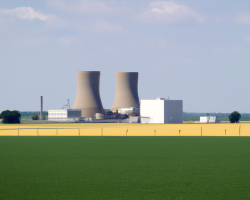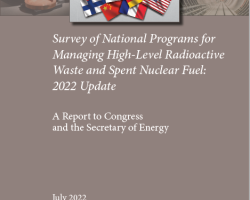Category of Content
Siting Experience Documents Only
Publication Date
Subject Matter
Keywords
Thermal Hydraulic Modeling of a Dry Cask and Microchannel
Thermal Hydraulic Modeling of a Dry Cask and Microchannel
Small-Scale Drying: FY2019 Interim Report
Small-Scale Drying: FY2019 Interim Report
Development of a Mechanistic Thermal Aging Model for Grade 91
Development of a Mechanistic Thermal Aging Model for Grade 91
Small-Scale Drying FY2020 Interim Report
Small-Scale Drying FY2020 Interim Report
Test Plan for the Horizontal Dry Cask Simulator?
Test Plan for the Horizontal Dry Cask Simulator?
Update on the Simulation of Commercial Drying of Spent Nuclear Fuel
Update on the Simulation of Commercial Drying of Spent Nuclear Fuel
TSL-CALVIN Software Verification and Validation
TSL-CALVIN Software Verification and Validation
Preliminary Used Nuclear Fuel Storage Design Concept
Preliminary Used Nuclear Fuel Storage Design Concept
Intergenerational Ethical Issues and Communication Related to High-Level Nuclear Waste Repositories
Intergenerational Ethical Issues and Communication Related to High-Level Nuclear Waste Repositories
Purpose of Review: The nuclear power industry started in the 1950s and has now reached a phase of disposing high-level nuclear waste. Since the 1980s, the United Nations has developed a concept of sustainable development and governments have accordingly made ethical commitments to take responsibility towards future generations. The purpose of this review is to examine ethical dilemmas related to high-level nuclear waste disposal in a long-term perspective including potential access to the waste in the future.
Thermal Modeling of NUHOMS HSM-15 and HSM-1 Storage Modules at Calvert Cliffs Nuclear Power Station ISFSI
Thermal Modeling of NUHOMS HSM-15 and HSM-1 Storage Modules at Calvert Cliffs Nuclear Power Station ISFSI
Science based responses to social myths on nuclear energy
Science based responses to social myths on nuclear energy
In order to promote a sound basis for considering the role of nuclear in climate change, this review spans the technical topics of social and political debate surrounding nuclear energy with a focus on the objective science of these issues including nuclear waste, accidents and overall risk. Novel aspects include the emergence of nuclear energy as being potentially renewable and the antithesis of Fukushima being an argument for the unacceptable risks associated with the use of nuclear energy.
Survey of National Programs for Managing High-Level Radioactive Waste and Spent Nuclear Fuel: 2022 Update
Survey of National Programs for Managing High-Level Radioactive Waste and Spent Nuclear Fuel: 2022 Update
In October 2009, the U.S. Nuclear Waste Technical Review Board (Board or NWTRB) published Survey of National Programs for Managing High-Level Radioactive Waste and Spent Nuclear Fuel. For each of the 13 national programs studied, the report catalogued 15 institutional arrangements that had been set in place and 15 technical approaches that had been taken to design repository systems for the long-term management of high-activity radioactive waste.


